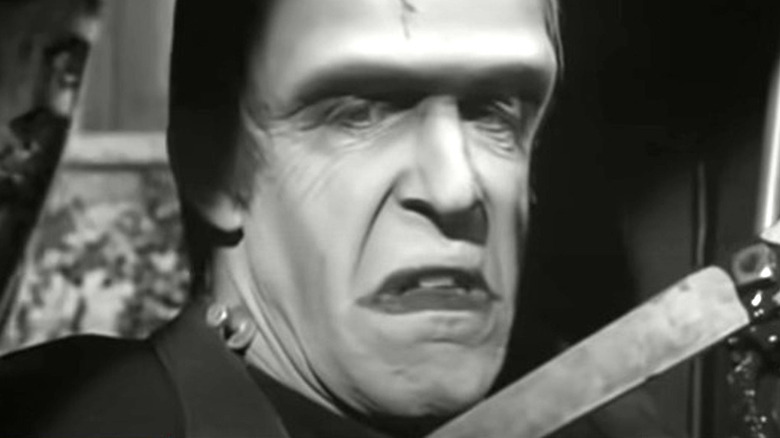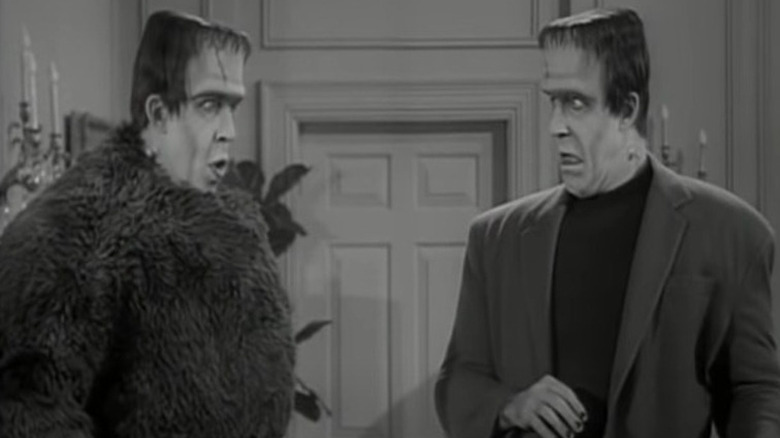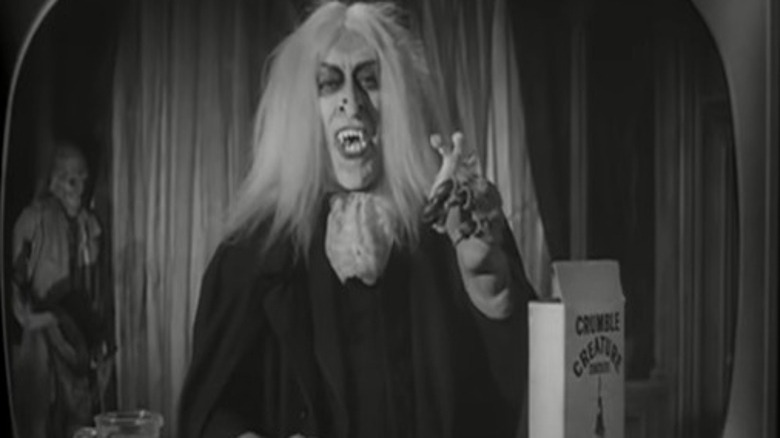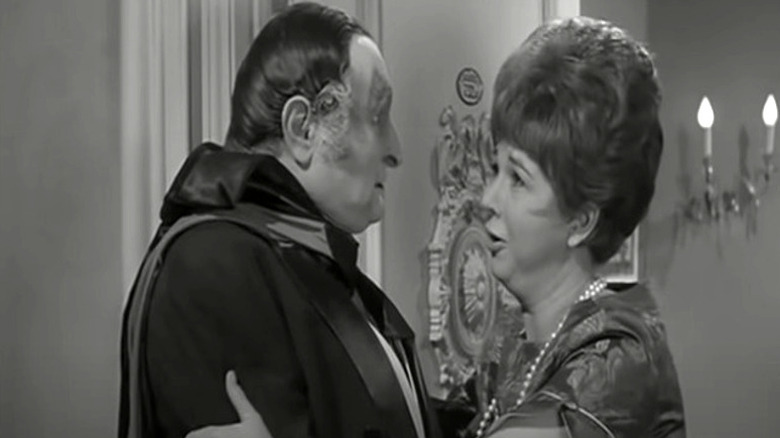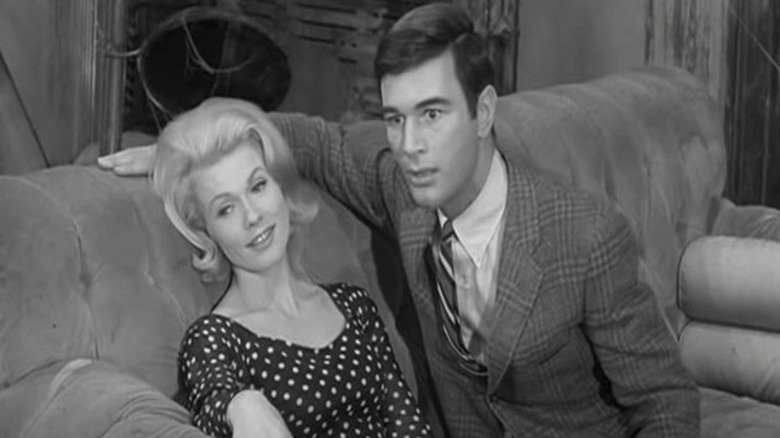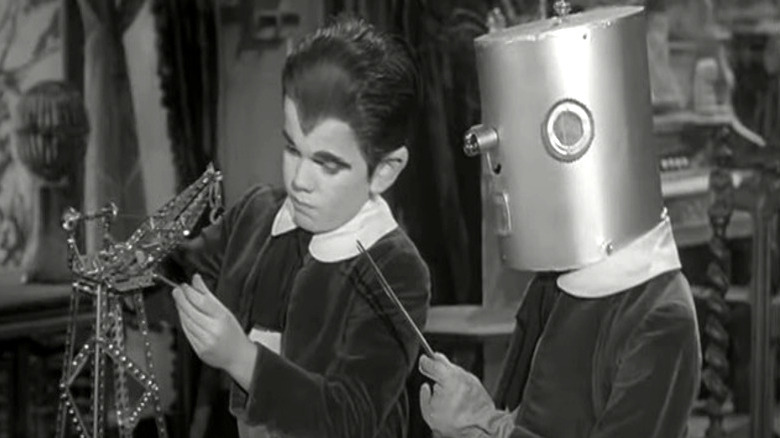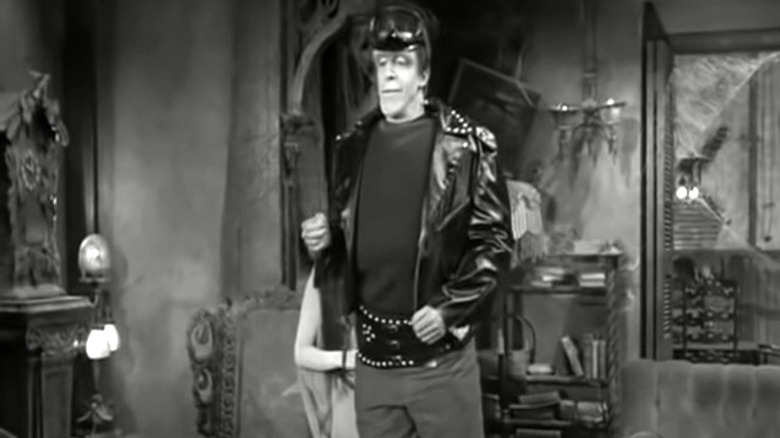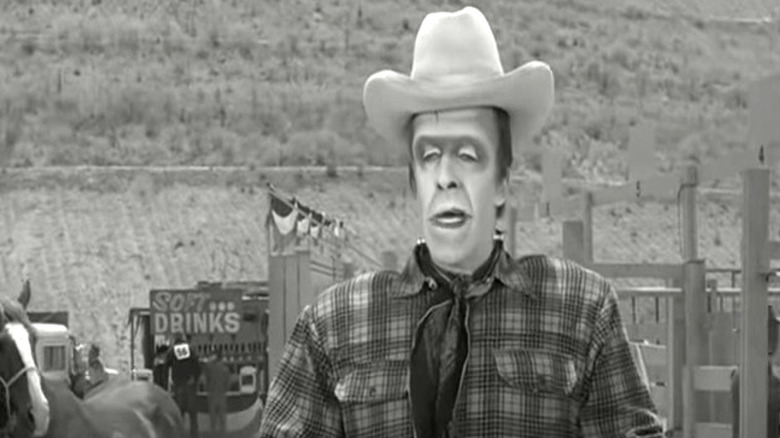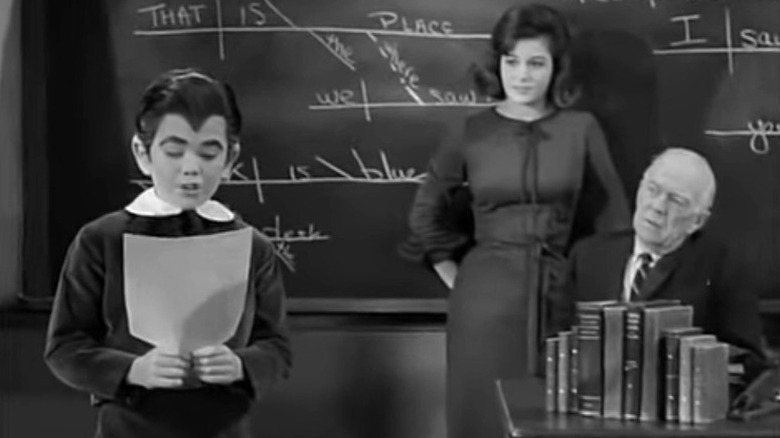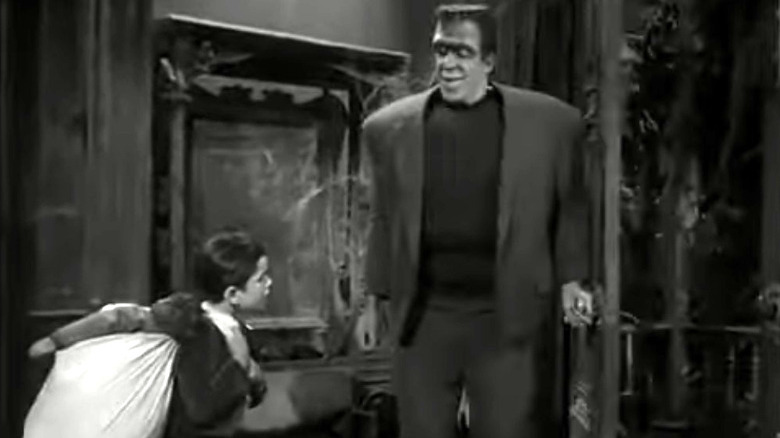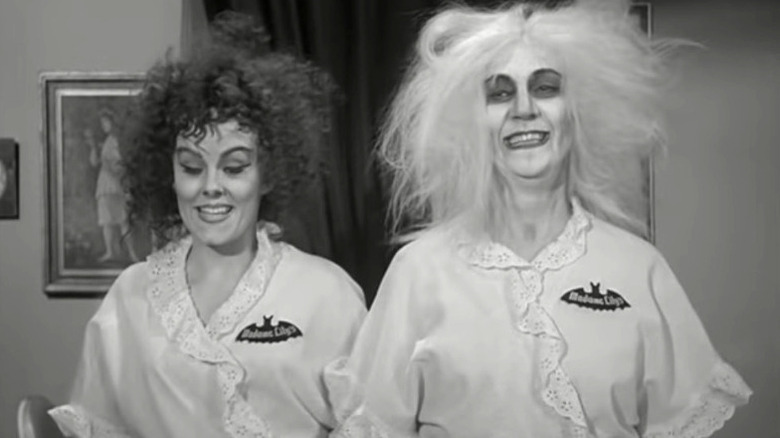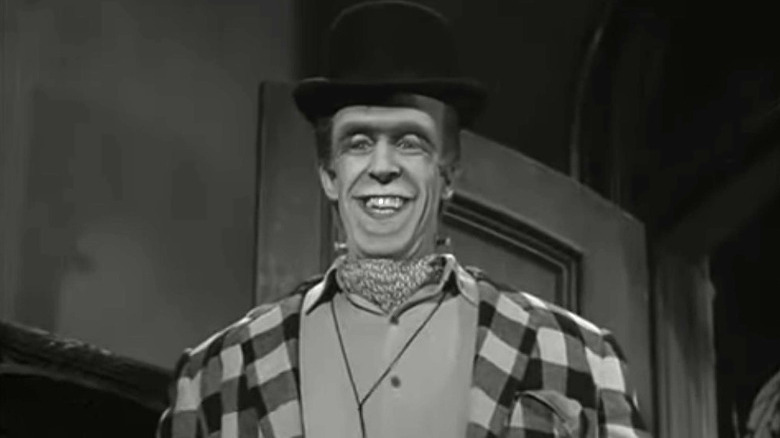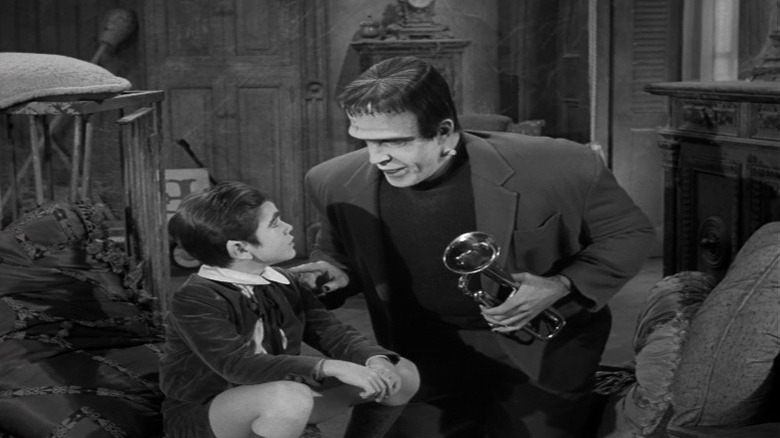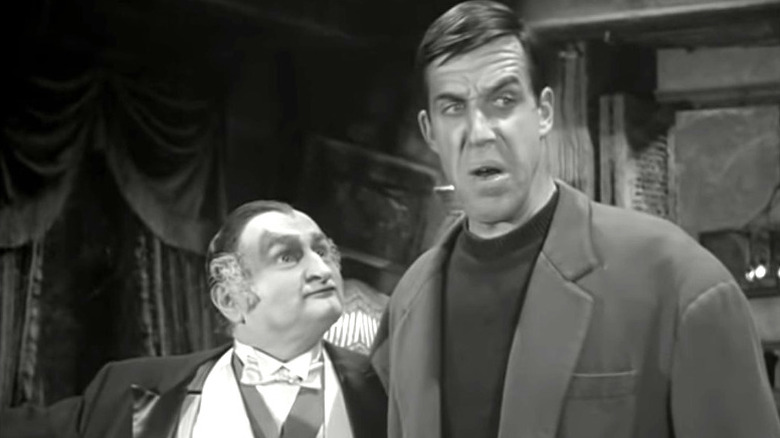The 7 Best And 7 Worst Episodes Of The Munsters Ranked
The memorable sitcom "The Munsters" ran for two seasons on NBC, from 1964 to 1966. The story of a family of immigrants from Transylvania (who happen to be based on the classic Universal Monsters), it's every bit as wholesome as other family sitcoms from the time, but with a macabre edge. Unlike their unofficial rivals The Addams Family, the Munsters have no idea they're strange. They're as normal as can be as far as they're concerned, and the rest of the world is inhabited by a bunch of weirdos.
During its run, the show found different ways of exploiting that setup for comedy. Some episodes are true classics with moments and images that are remembered fondly to this day. The series wasn't immune to broadcasting a few clunkers, however. When you're producing over 30 episodes a season, there are bound to be a few dull notes; that's just the nature of the beast.
To honor this enduring classic, we're taking a look back at some of the very best episodes the show had to offer, as well as the absolute worst. For the most part, the line between "best" and "worst" is actually quite narrow: Even the crummiest episodes could have been spun into gold with small tweaks.
Worst: A Visit from Johann
We're starting this list with an episode that could have easily been considered one of the greats had the script been more in sync with the story. The set up in "A Visit from Johann" is simple: Munster patriarch Herman meets a descendent of Dr. Frankenstein and learns that he has a younger, dumber brother named Johann. We've already seen Herman's articulate and suave twin brother at this point, so to then watch him interact with an even more childish version of himself and having that shift in the family dynamic is new and interesting.
The problem is the episode doesn't do much with it. Early on, Lily reminds Herman to leave work early on Friday because they have a romantic getaway planned. Later, Lily confuses Johann with her husband and takes him on the trip instead. There was plenty of opportunity to show Lily trying to have a good time with this stranger, but everything is limited to a car ride. Had the writers focused more on Lily having no idea that the lug she's spending time with is not her husband (or maybe even the rest of the family not even noticing the difference between Herman and his sibling), the whole thing would have no doubt gone over like a charm. Well, at least it's cool to see Johann dressed as Boris Karloff.
Best: Zombo
One of the most interesting things about Rob Zombie's "Munsters" movie is the inclusion of deep cut characters. Of those characters, Zombo was perhaps the biggest surprise. Not because he isn't a fun or memorable character (the design alone is fantastic), but because he isn't a monster. Zombo is a children's television host that Eddie Munster absolutely adores, much to Herman's chagrin.
Aside from being funny (which is the most important element of a sitcom), the episode "Zombo" is very sweet. Herman is jealous of Eddie's love for Zombo and decides to "improve" his looks to be even more monstrous, but it doesn't work. Eddie tells his pop that changing his own looks doesn't make him as cool as Zombo because Zombo is genuine.
Eddie then gets to visit the show and meet his idol in real life. The poor kid is horrified to learn that Zombo is just an actor in makeup. He exposes the truth live on television and earns a new appreciation for his dear old dad. All the actors are on top of their game here, and the story tugs at the heartstrings just enough without getting too sickly sweet.
Worst: Grandpa's Lost Wife
Grandpa Munster is a lot of things. He's a father and a grandfather, a mad scientist, Count Dracula, and a guy with a lot of wives. It makes sense that there'd be a woman out there he forgot he married, but all is not as it seems in "Grandpa's Lost Wife."
In this episode, Grandpa has a wife who he has apparently forgotten about. She puts an ad in the paper trying to find him, but he has no memory of her and no interest in meeting. Through a small mishap, she is informed of where he's staying and Grandpa is forced to meet with her. It turns out this woman is rich and that she and Grandpa used to live a luxurious life. He quickly decides to leave the family behind and live with her "again."
That is a compelling conflict for both drama and comedy. They could have really leaned into the idea of Grandpa disrupting the family to move away with this woman he can't remember. Unfortunately, this is all crammed into the final third of the episode, where it's also revealed that she's been scamming him the whole time. A simple shift in focus and this episode could have been a lot better.
Best: Love Comes to Mockingbird Heights
The Munsters think they're as normal as can be, all Except for Marilyn. Even though she resembles the glamorous movie star who shares her name, Herman and Lily's niece Marilyn just can't seem to keep a boyfriend. Every time she brings one home, they get spooked and sprint out of there. Since she doesn't conform to her family's idea of beauty, she (and the rest of the family) assumes she's just too darn ugly to find love. That changes when they receive $180,000 worth of gold doubloons in the mail from their uncle Gilbert. He would like them to look after it until he arrives in America, so Lily and Herman have it deposited in the bank. An employee of this bank sees Marilyn and is absolutely smitten.
Lily and Grandpa are so anxious to get Marylin married that they orchestrate a date between the two — which scares Marilyn's beau off. Temporarily, anyway. "Love Comes to Mockingbird Heights" is actually about a gold-digging young man who is willing to romance Marilyn to get the money he assumes she's entitled to. The episode builds to this reveal and pays it off nicely, resulting in a satisfying viewing experience. The capper, though, is discovering that Gilbert is none other than the actual Creature from the Black Lagoon.
Worst: Eddie's Brother
Depending on his motivation, Grandpa's inventions are either great or awful. When driven by greed, his work tends to blow up in his face. When attempting to be altruistic, as he is in "Eddie's Brother," his brilliant mind fires on all cylinders. The episode starts with Eddie confessing to his parents that he'd like to have a baby brother. Herman's game to try, but Lily shuts that down real quick because Eddie would be so much older than a sibling and she's pretty sure he just wants someone to play with.
Herman attempts to be a buddy to Eddie, but it's not the same. So, Grandpa heads down to his lab and builds an actual working robot who not only spends time with Eddie but dotes on the rest of the family as well. Yet again, the conflict is introduced a little too late for it to drive the episode. Eddie is jealous of all the attention his mechanical bro is getting and starts to lash out. This dynamic should have been exploited for longer, but it barely has any time to breathe, resulting in a mostly-dull episode that deserved better.
Best: Hot Rod Herman
Even if you've never seen an episode of "The Munsters," there's still a pretty good chance that you've encountered images of them in some capacity. Perhaps the most famous of those images is that of Herman decked out in leather from the episode "Hot Rod Herman." You take Herman Munster — the lovable but goofy version of Frankenstein's monster — and put him in a slick outfit he would never normally wear, and you've got more than a good gag, you've got an iconic moment.
The episode sees Herman failing to win a drag race after Eddie brags to a friend (whose father is a professional racer) that his dad could outrace anyone. After losing the family car in the race, Grandpa builds his own ride (the Drag-u-la) to win it back. It's great because it puts a very cocky Herman in a situation he has no business being in, and it forces him to dig his way out of trouble. Years later, Herman's classic leather jacket look was used in the trailer for Rob Zombie's movie adaptation, though the updated version has a few added shoulder spikes for good measure.
Worst: Bronco-Bustin' Herman
Either "Hot Rod Herman" was such a fun episode to make or the network received a ton of fan mail, because the episode was essentially remade in Season 2 as "Bronco-Bustin' Munster." It wasn't just a similar concept either — most of this episode's plot is taken directly from the Season 1 episode, with little effort made to disguise that fact. Once again, Eddie brags to someone that his dad is amazing at something he's never tried before (this time it's a rodeo) and Herman is forced to prove himself in an unfamiliar situation.
Herman has rivals in the competition who agree to sabotage his chances of winning the prize money. Plus, we see Herman strut around in a new outfit and exude unearned confidence. Where the episode differs is Herman actually wins on his own merits after Grandpa's plan to transform himself into a horse backfires. That's not nearly enough of a change to save this pale imitation of a much better episode, though.
Best: A Visit from the Teacher
This may sound strange but it's a compliment: Despite being the series finale, "A Visit from the Teacher" plays like the best first episode any series could hope for. Ending a television show is difficult. Even if you know the last episode is coming, getting that final story right is a challenge. Of course, there are examples of both good and bad series finales, but summing up what makes a beloved series great in a single episode is sometimes an impossible task.
"The Munsters" gets it right by remixing the old hits. The episode sees Eddie writing an essay about his average American family. The details are so unbelievable that his teacher asks Eddie to stay after school and read his report to the principal. The old man laughs it off and assumes it is the product of a young boy's imagination but decides to visit the Munsters to discuss the report with them.
He quickly learns that everything Eddie wrote about is true. We get to see the Munsters through the eyes of "normal" people again and it reminds us of why we enjoy them so much. A lot of the jokes are similar to ones we've seen before, but they've changed just enough for them to feel familiar and timeless rather than derivative. By reaffirming the premise of the series, the creators allowed us to say goodbye to Mockingbird Heights fondly.
Worst: Herman's Child Psychology
"Herman's Child Psychology" may be the best example of an episode that could've been great with some tweaks. Eddie has a friend named Charlie who is fed up with how mean parents are to kids. He tells Eddie that his parents are mean to him too, he just doesn't see it. Charlie intends to run away and live in a cave in the woods and suggests Eddie should do the same.
Confused, Eddie gets mad at his family for not being angrier with him for past mistakes (seeing it as a sign that they don't care about him) and announces he will be running away. Herman, who thinks he's as intelligent as a licensed child psychologist, decides to let Eddie go through with his plan, assuming he'll come right back. Everything is set up for Eddie to realize how wrong he is and how much his family loves him.
Instead of that, the episode resolves Eddie's issues off camera in favor of having Herman dance with an escaped bear. It's a funny image, but all the goodwill the writers have accumulated up until that point vanishes and you no longer care about what's happening. Couldn't they have kept Herman dancing with a bear while still trying to track Eddie down in order to provide a more satisfying conclusion? "Herman's Child Psychology" feels like another missed opportunity.
Best: The Most Beautiful Ghoul in the World
"The Munsters" was meant to deconstruct the public's perception of a functioning American family. Just think about all the episodes in which Herman and Grandpa obsess over money. These are monstrous creatures from Transylvania who eschew most concepts that the audience would consider normal, but they're just as anxious to get rich as anybody else.
"The Most Beautiful Ghoul in the World" plays into this by pitting Herman and Grandpa against Lily and Marilyn to see who can best turn recently inherited money into a fortune. When the family receives a $10,000 inheritance (an even more impressive figure back then), they can't decide what to do with it. Grandpa wants to perfect a machine that sends electricity through the air without wires and Lily wants to open a beauty salon.
They decide to split the funds and pursue their own goals. The episode is perfectly plotted with the action progressing at a thrilling pace. Through a series of mishaps and misunderstandings, they realize that if they'd just worked together instead of moving ahead divided, their entrepreneurial efforts could have complimented each other, making them rich. Instead, their independent efforts result in $10,000 going to waste.
Worst: Knock Wood, Here Comes Charlie
Consequences are important in storytelling, even in comedy. There needs to be weight to the decisions made by characters — they have to mean something. In sitcoms, the situation routinely gets worse for a character before getting better at the end. "Knock Wood, Here Comes Charlie" is a superb example of what happens when you fail to incorporate this into your sitcom script.
Herman has a charming and suave twin brother named Charlie who shows up and immediately weasels his way into the good graces of everyone except Herman. Everyone is blown away by his invention that supposedly extracts uranium from seawater. It's nice to see actor Fred Gwynne get to stretch as a performer, but very little is done with the opportunity. The episode promises a divide between our main cast that threatens to tear everyone apart, with only Herman and Marilyn able to see that Charlie is nothing but a snake oil salesman.
This never happens, though. Everyone is on the verge of having something very bad happen to them, but nothing ever does. By the end of the episode, when Charlie gets his comeuppance, it feels unearned because nothing actually happened. Nobody's life was inconvenienced enough to warrant a moment of rejoicing over Charlie's sudden misfortune. The whole thing rings hollow, unfortunately.
Best: Herman the Rookie
The following episode contains outdated and offensive language.
The reason "Herman the Rookie" doesn't clinch the top spot on this list is that it contains an instance of a character using a racial slur to describe the Munsters. The episode has got everything a great episode of "The Munsters" needs: Herman in an unlikely situation suffering from delusions of grandeur, an exploration of an iconic Americana, and a tight plot. Herman inadvertently hits a baseball a long way, and it just so happens to hit promoter Leo Durocher (playing himself) in the head. Durocher is so impressed by the power of Herman's swing that he recruits him to play for the Dodgers. You can guess where this is going to go from the start, but the specifics are what elevate the premise.
Herman is excited to earn a fortune and to become famous in general. Yes, he's incredible at the game, but he's also unconsciously destructive, breaking bats, damaging gloves, running through fences and knocking teammates over with his physical power, meaning Folks are too scared to play with him. Having him play for the team would cost them more than they would earn in ticket sales. His dreams of stardom are dashed, but at least he still has a family who loves him no matter what.
Worst: The Musician
"The Musician" takes everything that's wrong with the aforementioned episode "Knock Wood, Here Comes Charlie" and doubles down. Herman is so desperate to have Eddie learn to play an instrument in order to impress his boss that Grandpa is forced to develop a potion that will make Eddie play better (the child has no talent for music and doesn't want to learn). Eddie plays a real jazzy number and Herman's old-fashioned boss is so offended he fires Herman and walks off.
It's an odd turn of events. We know little about Herman's standing with his boss at this stage, so there's really no jeopardy going into this moment. When he's fired, it comes out of nowhere and has no impact on the story whatsoever. What's more, Herman doesn't seem to care about losing his job, only about curing Eddie of his jazz fever (the potion turns him into a beatnik).
When the boss comes around to apologize and give Herman his job back, he decides to give Eddie another chance. Without the assistance of Grandpa's concoction, however, Eddie's playing is horrible, yet the boss suffers through it. The main idea behind the episode seems to have been, "Wouldn't it be funny if Eddie said daddy-o?" No. It's not funny and the episode is just plain boring.
Best: Just Another Pretty Face
There's really only one joke in "Just Another Pretty Face" — Herman looks human. That's it. There's nothing else really going on in the episode. Herman walks into Grandpa's lab at the wrong moment, gets zapped by lightning, and wakes up looking like Fred Gwynne. The scars are gone, the bolts in his neck are gone, and the features that Lilly loves are gone.
Seeing Herman the human makes the entire family feel uncomfortable. Even Eddie treats him like a stranger. They go to see Dr. Dudley (played by the iconic Dom DeLuise) hoping he can help, but the good Doctor thinks Herman looks fantastic. Grandpa finds Herman's original blueprints and tries to fix him, turning him into a woman instead. This stretch of the episode hasn't aged well but it's mercifully short.
The reason this episode works so well is because of Gwynne's performance. The simplicity of the plot allows him to take center stage and act his heart out. We get to appreciate just how expressive he is as an actor. Without all that makeup on his face, he's able to play all the conflicting emotions going on in Herman and they come across crystal clear. In the hands of a lesser actor, this would have been mildly interesting. With a master like Gwynne, it's the best episode of "The Munsters" ever.
